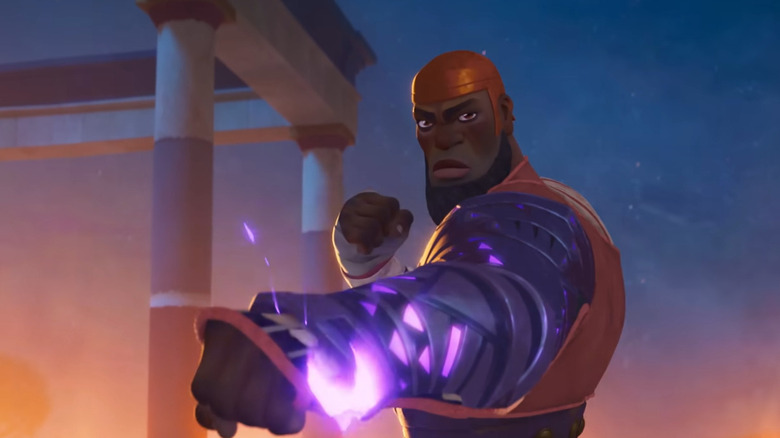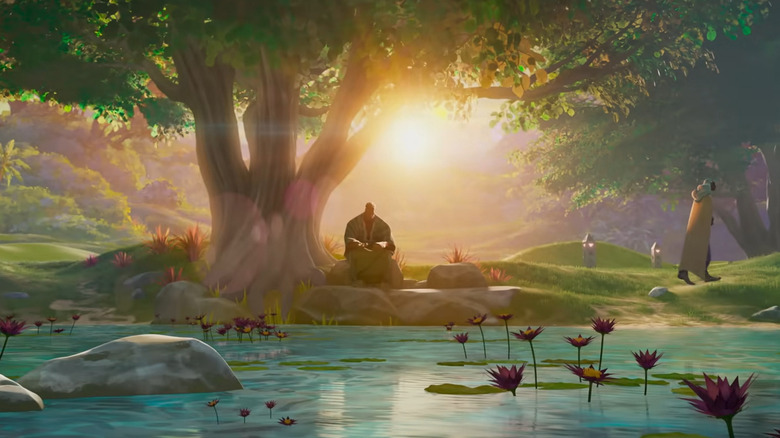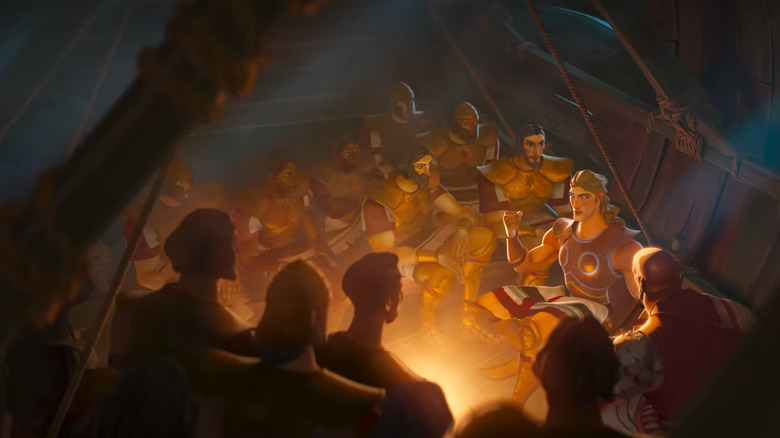Eyes Of Wakanda Takes Another Step Forward For The MCU, But It Still Reveals Marvel's Cowardice
This article contains spoilers for "Eyes of Wakanda."
Everyone knows that Achilles is gay. It's 2025. I don't care what Brad Pitt told you back in 2004, but we live in a different world now — a world where, when you see Achilles in a thing, you should know to immediately start looking for the queer rep. So that's exactly what I did when I saw the famous Greek hero pop up in episode two of Marvel's new "Eyes of Wakanda" animated series.
Now, I know what you're thinking. Achilles and queer storylines go hand in hand. But the MCU? Sort of the opposite. Yes, we all loved "Agatha All Along," which is probably the most explicit, canonical, interesting queer representation in the franchise to date. But other than that, Joe Russo's cringy cameo in "Avengers: Endgame," and a few pride pins that you have to squint to see? It's slim pickings.
At this point, most queer fans like myself know that big Disney properties are likely never going to be the place to look for real representation or interesting queer stories. It takes a real Dana Terrace to eke gay blood from that particular stone. But I'm nothing if not a glutton for punishment, which means that in this particular context, I will still make the leap to connect to dots for a shred of progressive storytelling.
"Eyes of Wakanda" episode gives more dots to connect than we typically get. The story takes place during the literal Trojan War and stars Achilles (Adam Gold) and his close friend Memnon (Larry Herron), known as B'kai in his native Wakanda. Historians will say they were just roommates, but we know better.
Eyes of Wakanda episode 2 is extremely queer-coded
In most ways, "Eyes of Wakanda" episode 2 recreates the standard beats of the Trojan War pretty accurately. Odysseus schemes, Priam hides, and the Greeks fail again and again in their attempts to breach the city. Their greatest weapon is an elite squad led by Achilles and Memnon, who is secretly an agent of Wakanda sent to recover a vibranium artifact held by Helen of Troy. His camaraderie with Achilles, however, is deeply real.
There is no Patroclus in this story. The writers conveniently cleared the runway of any other likely love interests. And while we don't get a kiss or a declaration of love between the two men, we do get loads of knowing looks, charged exchanges, and gorgeous shots. "Thank you for being here," Achilles says after a particularly emotional conversation. Later, he insists Memnon take a pendant he received from his mother — a token of his, uh, friendship, surely. "For everything you've done," he says when Memnon says it's too much. "For everything we have been through."
Of course, B'kai's true mission and loyalty to Wakanda lead him to betray Achilles — or at least, that's how the Greek sees it. They fight, and when Achilles refuses to hand over the vibranium artifact, Memnon strikes him dead, holding his limp body tenderly in the aftermath. "Was everything a lie?" Achilles asks with his last breath? And we know what he really means. "Not everything," Memnon replies, tears in his eyes.
Marvel's wink-and-nod approach to queerness doesn't cut it any more
tragic story, and of course, something very Greek too. Only a lover can make you feel so betrayed. It's so obvious, watching the story as a queer fan, what the writers and performers are going for here. Again, this is Achilles. He's basically the patron saint of literary gayness at this point. You don't choose that character for this kind of story lightly. You do it because of what it means.
And what this means, sadly, is still pretty lackluster. To be clear, I don't think this particular story needed a chaste kiss or explicit declarations of love. The subtlety is nice. But it's the knowledge that the creators would have had to fight tooth and nail for either of those things that gives me pause. When your franchise hardly ever features canonical queerness, subtlety only ever supports that suppression — even if it'd done well. At this point, I'm tired of filling in the gaps myself, and I think a lot of queer fans feel the same. You can only push queer love to the margins so much before that marginalization becomes the representation itself. If you only ever hide these relationships, then you're saying implicitly that they are things to be hidden.
I know that Wakanda, as a concept, is an inherently political idea. In these repressive times, I'm not asking Black creators to go to bat for every kind of diversity at once. At the same time, it's unfortunate to realize that implied queerness may be the only norm we ever get from the Disney machine. "Agatha All Along" doesn't seem to have been the door-kicker some may have hoped for.


